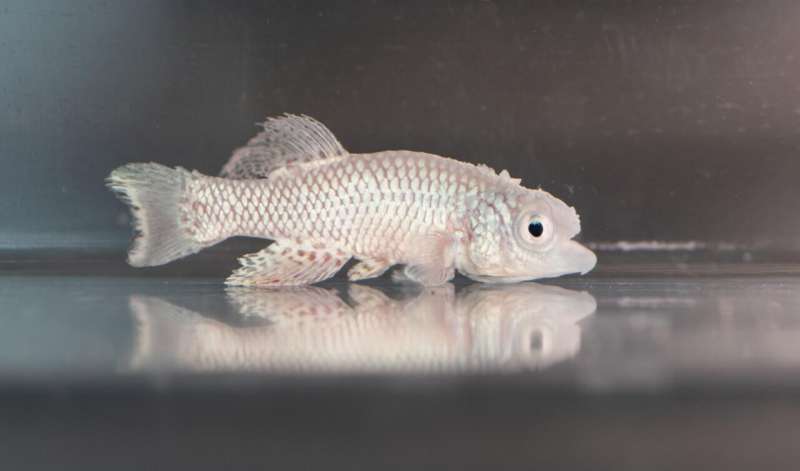This article has been reviewed according to Science X's editorial process and policies. Editors have highlighted the following attributes while ensuring the content's credibility:
fact-checked
peer-reviewed publication
trusted source
proofread
Cycle of fasting and feeding is crucial for healthy aging, killifish study suggests

Fasting interventions, which involve alternating periods of fasting and refeeding, are generally thought to improve health. But these interventions don't work as well in old animals. The question is: Why?
By studying the short-lived killifish, researchers at the Max Planck Institute for Biology of Aging in Cologne have shown that older fish deviate from a youthful fasting and refeeding cycle, and instead enter a state of perpetual fasting, even when ingesting food.
However, the benefits of refeeding after fasting in old killifish can be restored by genetically activating a specific subunit of AMP kinase, an important sensor of cellular energy. These mutant fish experienced improved health and longevity, indicating that both fasting and refeeding are needed to confer health benefits and act through AMP kinase to do so.
It has already been shown in many model organisms that a reduced diet, either through calorie restriction or periods of fasting, has a positive effect on health. However, it is difficult for humans to eat less throughout life. In order to find the most opportune timing for fasting, researchers introduced fasting interventions at different ages, finding that these interventions in older age do not yield the same benefits as they do in younger animals.
A team of researchers from Cologne, Germany, has now investigated the age-related fasting effects in killifish. Killifish are rapid-aging fish that go from young to old in just a few months. The researchers either fasted young and old fish for a few days or fed them twice a day. They found that the visceral adipose (fat) tissue of old fish became less responsive to feeding.
"The adipose tissue is known to react most strongly to variations in food intake and has an important role in metabolism. That's why we looked at it more closely," explains Roberto Ripa, lead author of the study.
The researchers found that the inability to respond to the feeding phase set the fat tissue of old fish in a permanent state of fasting: energy metabolism is shut down, protein production is reduced, and tissue is not renewed. "We had assumed that old fish would not be able to switch to fasting after feeding. Surprisingly, the opposite was true, the old fish were in a permanent fasting state, even while eating food," says Adam Antebi, Director at the Max Planck Institute for Biology of Aging and leader of the study.
Adipose tissue in a permanent fasting state
When the researchers looked more closely at how the fatty tissue of the old fish differed from that of the young, they came across a specific protein called AMP kinase. This kinase is a cellular energy sensor and is made up of different subunits, of which the activity of the γ1 subunit decreases with age. When the scientists increased the activity of this subunit through genetic modification, the fasting-like state was counteracted and the old fish were healthier and even lived longer.
Interestingly, a link was also found between the γ1-subunit and human aging. Significantly lower levels of the particular subunit were measured in samples from elderly patients. In addition, it was possible to show in the human samples: the less frail a person is in old age, the higher the level of the γ1-subunit.
"Of course, we don't yet know whether in humans the γ1-subunit is actually responsible for healthier aging. In the next step, we will try to find molecules that activate precisely this subunit and investigate whether we can use them to positively influence aging," explains Adam Antebi.
The research is published in the journal Nature Aging.
More information: Roberto Ripa et al, Refeeding-associated AMPKγ1 complex activity is a hallmark of health and longevity, Nature Aging (2023). DOI: 10.1038/s43587-023-00521-y





















